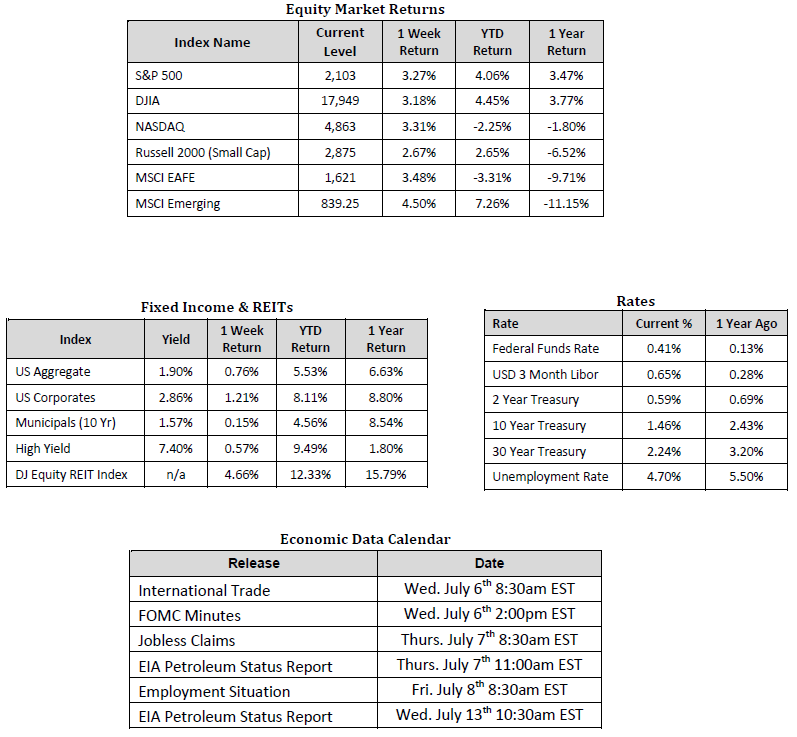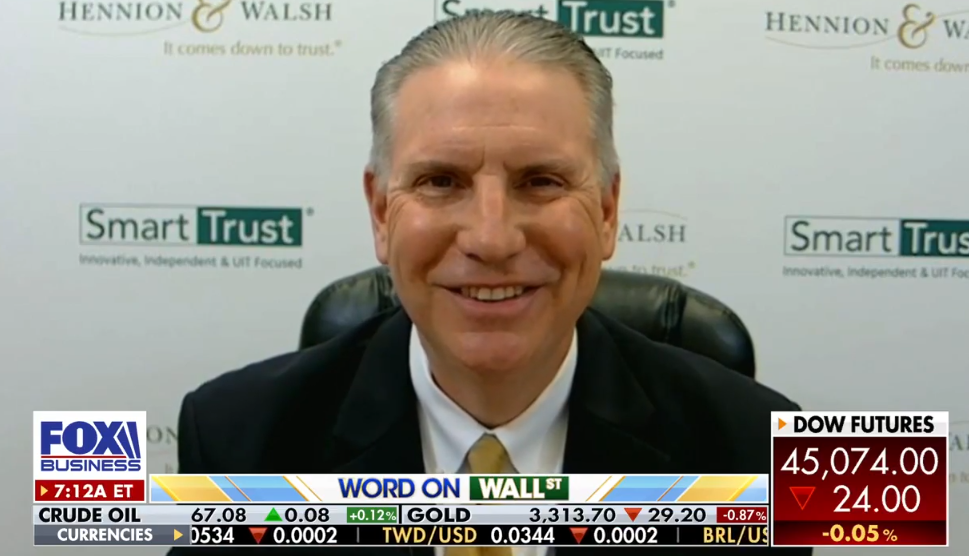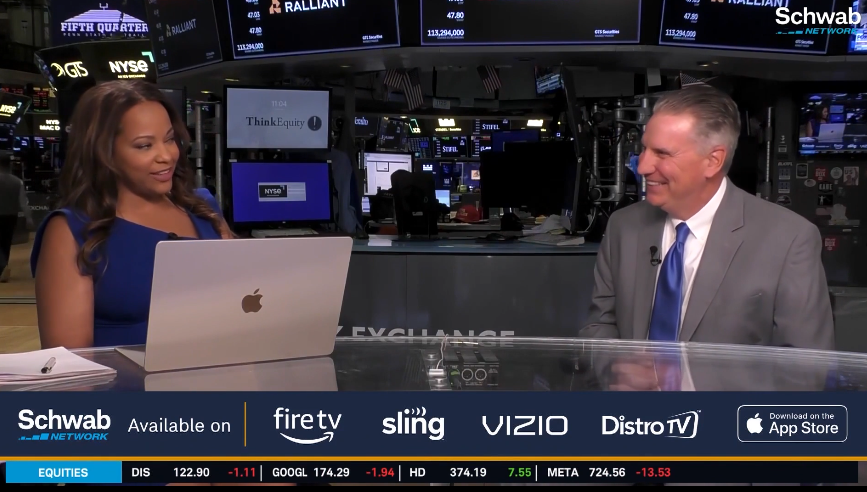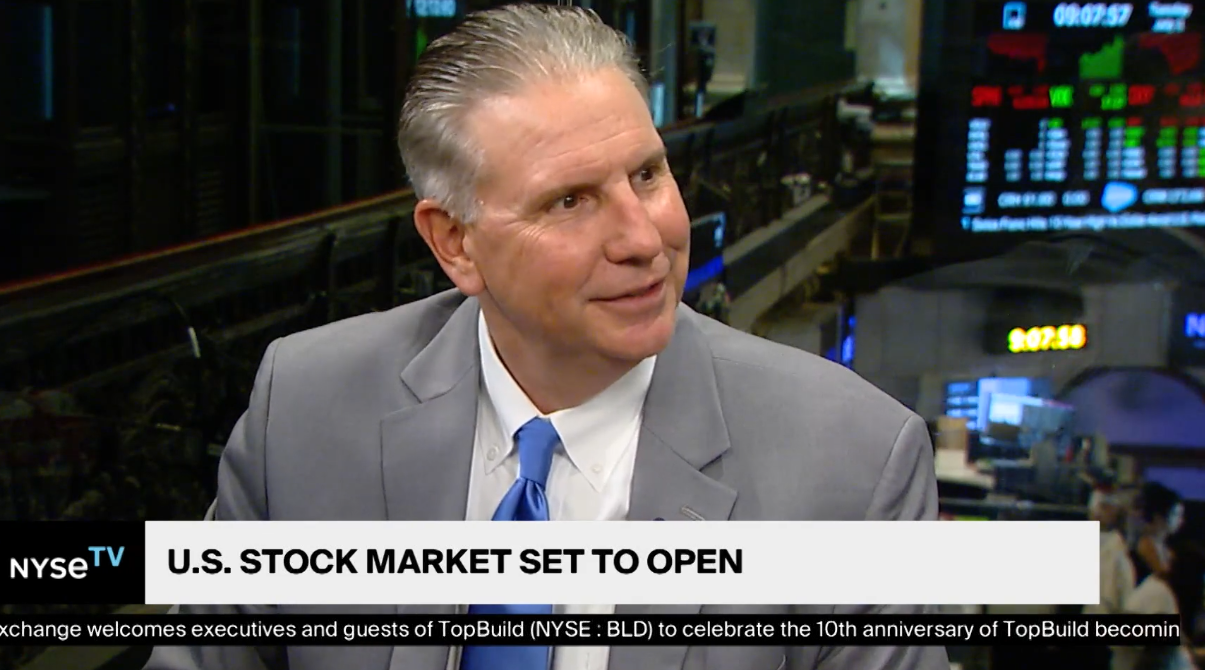
Markets Rebound, Post Best Weekly Returns of 2016
Market Overview

Sources: Equity Market, Fixed Income and REIT returns from JP Morgan as of 07/01/16. Rates and Economic Calendar Data from Bloomberg as of 07/05/16.
Happening Now
Markets rebounded aggressively last week, posting some of the best weekly returns of 2016. For example, U.S. stocks, as measured by the S&P 500 Index, gained 3.3%, international developed markets, as measured by the MSCI EAFE Index, gained 3.5% and the MSCI Emerging Market Index moved 4.5% higher. The pace of these advances suggests that investors took advantage of the Brexit fallout and were able to purchase securities for discount prices while shrugging off potential short-term Brexit-related concerns.
We do not believe, however, that volatility is in the rearview mirror and expect that the concerns over the likely implications of the Brexit will persist. During the summer months, when volume is typically low relative to the rest of the year, small catalysts can cause large disruptions in asset prices. In addition to debate over when the Federal Reserve will act next, speculation over how the world economies will, or won’t, be affected by the U.K’s vote to leave will likely continue to set the tone for daily stock market moves. As we have said in the past, the driver of longer term U.S. stock market gains, we believe, will be a product of our own economy and how it leads global economic growth as opposed to vice-versa.
Economic data over the course of the past few weeks has been mostly positive. In addition to an upward revision in Q1 GDP from 0.8% to 1.1%, the housing market and the employment situation continue to improve. Last week’s Jobless Claims report showed that the four week average of 266,750 was unchanged and continuing claims were down, suggesting some degree of stability in the work force. Construction Spending, Pending Home Sales and New Home Sales have been volatile month to month but are also trending upward.
We expect news headlines, whether they are related to Brexit, the U.S. Presidential Election, or Central Bank Policy to continue to dominate the short term performance of the stock market but should play a less important role in longer term returns. This means that investors with a well thought-out, diversified portfolio must maintain discipline with respect to their strategy. Investors who find themselves having a difficult time trusting their strategy or are concerned that they are not positioned properly, must take the time now to review how their accounts are being managed and make adjustments as necessary.
Important Information and Disclaimers
Disclosures: Hennion & Walsh is the sponsor of SmartTrust® Unit Investment Trusts (UITs). For more information on SmartTrust® UITs, please visit www.smarttrustuit.com. The overview above is for informational purposes and is not an offer to sell or a solicitation of an offer to buy any SmartTrust® UITs. Investors should consider the Trust’s investment objective, risks, charges and expenses carefully before investing. The prospectus contains this and other information relevant to an investment in the Trust and investors should read the prospectus carefully before they invest.
Investing in foreign securities presents certain risks not associated with domestic investments, such as currency fluctuation, political and economic instability, and different accounting standards. This may result in greater share price volatility. These risks are heightened in emerging markets.
There are special risks associated with an investment in real estate, including credit risk, interest rate fluctuations and the impact of varied economic conditions. Distributions from REIT investments are taxed at the owner’s tax bracket.
The prices of small company and mid cap stocks are generally more volatile than large company stocks. They often involve higher risks because smaller companies may lack the management expertise, financial resources, product diversification and competitive strengths to endure adverse economic conditions.
Investing in commodities is not suitable for all investors. Exposure to the commodities markets may subject an investment to greater share price volatility than an investment in traditional equity or debt securities. Investments in commodities may be affected by changes in overall market movements, commodity index volatility, changes in interest rates or factors affecting a particular industry or commodity.
Products that invest in commodities may employ more complex strategies which may expose investors to additional risks.
Investing in fixed income securities involves certain risks such as market risk if sold prior to maturity and credit risk especially if investing in high yield bonds, which have lower ratings and are subject to greater volatility. All fixed income investments may be worth less than original cost upon redemption or maturity. Bond Prices fluctuate inversely to changes in interest rates. Therefore, a general rise in interest rates can result in the decline of the value of your investment.
Definitions
MSCI- EAFE: The Morgan Stanley Capital International Europe, Australasia and Far East Index, a free float-adjusted market capitalization index that is designed to measure developed-market equity performance, excluding the United States and Canada.
MSCI-Emerging Markets: The Morgan Stanley Capital International Emerging Market Index, is a free float-adjusted market capitalization index that is designed to measure the performance of global emerging markets of about 25 emerging economies.
Russell 3000: The Russell 3000 measures the performance of the 3000 largest US companies based on total market capitalization and represents about 98% of the investible US Equity market.
ML BOFA US Corp Mstr [Merill Lynch US Corporate Master]: The Merrill Lynch Corporate Master Market Index is a statistical composite tracking the performance of the entire US corporate bond market over time.
ML Muni Master [Merill Lynch US Corporate Master]: The Merrill Lynch Municipal Bond Master Index is a broad measure of the municipal fixed income market.
Investors cannot directly purchase any index.
LIBOR, London Interbank Offered Rate, is the rate of interest at which banks offer to lend money to one another in the wholesale money markets in London.
The Dow Jones Industrial Average is an unweighted index of 30 “blue-chip” industrial U.S. stocks.
The S&P Midcap 400 Index is a capitalization-weighted index measuring the performance of the mid-range sector of the U.S. stock market, and represents approximately 7% of the total market value of U.S. equities. Companies in the Index fall between S&P 500 Index and the S&P SmallCap 600 Index in size: between $1-4 billion.
DJ Equity REIT Index represents all publicly traded real estate investment trusts in the Dow Jones U.S. stock universe classified as Equity REITs according to the S&P Dow Jones Indices REIT Industry Classification Hierarchy. These companies are REITSs that primarily own and operate income-producing real estate.



